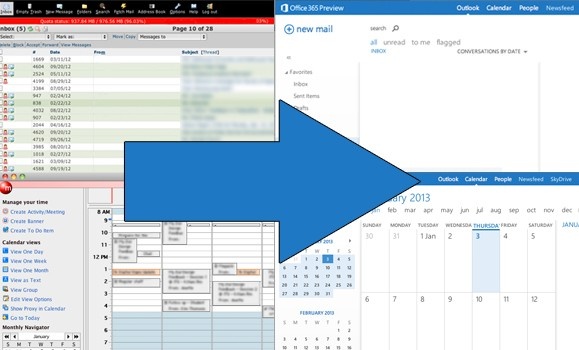The Dal community can expect a number of improvements to some key IT services later this year — including more email storage, a new calendar system and enhanced mobile support — resulting from a new agreement with Microsoft.
The university will be partnering with Microsoft to provide email, calendar services and other collaboration tools to the university through its Office 365 for Education platform. The @dal.ca email domain isn’t going anywhere, but the infrastructure to support it is entering a new era.
Dwight Fischer, Dalhousie’s assistant vice-president of Information Technology Services, explains that he’s been discussing such an external partnership with the Dal community through several town halls, consultations and vendor presentations across campus over the past few years.
“It’s about providing the latest and greatest IT tools, shared across the university,” says Fischer. “A leading university should have leading-edge communications and workplace tools, and that’s what Office 365 offers the Dal community.”
He adds that there is also a strong business case for working with Microsoft.
“The alternative is to spend upwards of $1-2 million to upgrade our aging systems over the next few years, and still struggle to keep up with the latest technology. Microsoft provides these services, contractually, free-of-charge to the university. We feel this is a smarter choice that lets us focus more of our IT resources on teaching and research.”
Fischer says the cost savings to the university will be in infrastructure and software, not personnel. He explains that existing employee roles are being aligned in support of the new platform.
More storage, broader support
In terms of what the Dal community can expect with Office 365 for Education, the service includes email, calendar, online word processing and similar software. Some of the key features:
- 25 GB of space per email account.
- A new calendar system to replace the variety of tools used on campus such as Meeting Maker and Groupwise. (As well, those who don’t presently use a calendar system will have the option to join if they choose.)
- Support for the most popular desktop clients, including Outlook and Apple Mail, plus a new webmail platform for Dal.
- Enhanced mobile support for iPhone, Windows, Blackberry or Android smartphones.
- Real-time document collaboration.
“One of the factors guiding this decision was that we wanted to provide our entire community, especially students, with the latest tools they’d expect to find in the modern workforce,” adds Fischer.
“Our ITS team has done its best with Dal’s current email and calendar systems, trying to keep pace with developments in the software industry. But this will certainly be a big leap forward for students, faculty and staff.”
Moving to the cloud
From a data perspective, the most significant change is that Dalhousie’s email and calendar data will now be hosted in “the cloud” — not on campus, but on servers around the globe. In town halls and forums hosted by ITS the past few years, this was often a point of contention, with individuals raising concerns about the data being more open to seizure.
Fischer says that his team listened closely to that feedback. The main reason for the gap in time between the campus consultations (largely held in 2011) and the signing of the agreement, he says, is the thoroughness of the legal review and risk impact analysis, led by the university’s legal team.
While the data will be hosted by Microsoft, it remains the property of the university and has no effect on Dal’s procedures and standards regarding intellectual property. Microsoft does not advertise on the service and only has access to the data or service with Dal’s permission.
“This is an agreement that meets Dal’s high standards for intellectual property, data security and other factors,” says Fischer. “We’ve reviewed the appropriate legislation and we have fulfilled the requirements to provide these services with Microsoft.”
He adds that the agreement includes a Dal-hosted version of SharePoint to serve as a repository for institutional data deemed sensitive or highly sensitive, keeping this data on campus.
“We’re not going out on our own here,” says Fischer. “In Canada alone, the Universities of Toronto, Alberta, Manitoba, New Brunswick and others have all teamed with an external provider for email, and it’s quickly becoming the norm in the United States as well.
“It’s about finding the ideal balance between quality of service, efficiencies and cost savings, and the safety and security of our data. That’s what we get through Office 365.”
Looking ahead
Office 365 will be available to the Dal community later this year. ITS is currently developing a comprehensive implementation plan to support the transition, and Fischer says those details will be shared in the coming weeks and months. ITS’ goal is to have all Dal email accounts on Office 365 by this fall, though no accounts will be moved during the winter term.
For more information on the project, including FAQs, you can visit Dalhousie’s Office 365 website. Dwight Fischer will also be hosting a live webinar where you can ask questions and learn more about Office 365 next Tuesday, January 22 at 12 noon. Log in and watch at http://ilores.ca/lll/itstownhall (link will be live one hour before the webinar).

